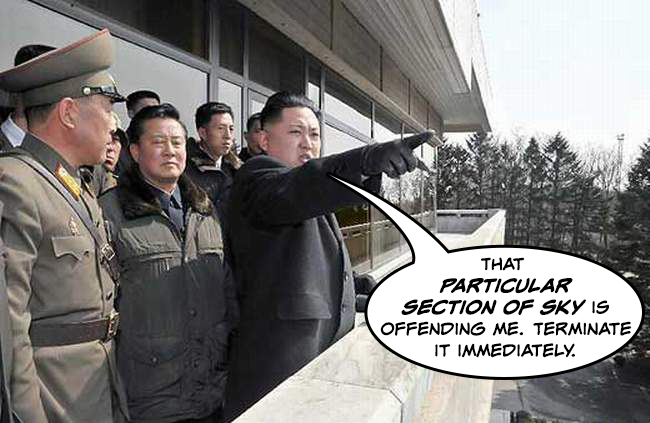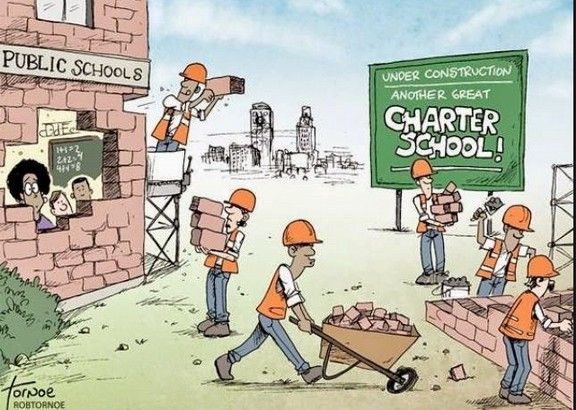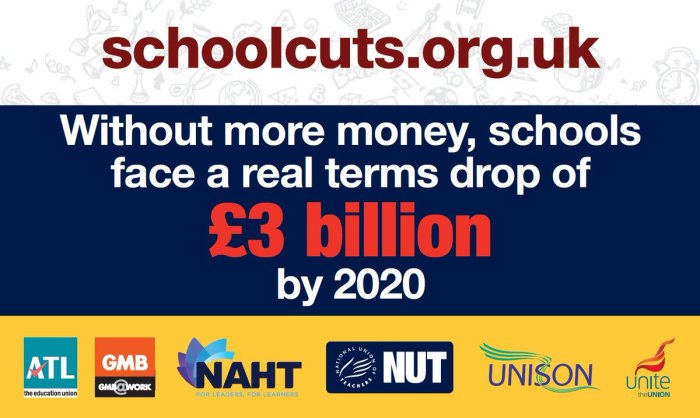This week, both the TES and Schoolsweek rather courageously put their heads above the parapet by running stories on what has become known as the “Flattening The Grass” scandal. Essentially, some academy chains -much praised by Ofsted- have been deliberately employing a policy of humiliating their pupils, often to the point of those pupils experiencing trauma and breaking down in tears. I wrote about this spread of deliberate emotional abuse of children in a previous blog. What is worth looking at in this case, is the way the “flattening the grass” case highlights how several different strands of Govian education policy have converged to deliver the outcome which is currently appalling those adults who believe children should be safe from abuse when they attend school.
How did this happen?
First, we should look at what changes the Tories have made to the education system which have enabled the events of “flattening the grass”.
The Cult of “The Leader”
Again, not my first time on this territory, and there’s no need to repeat everything I wrote about in this blog. The last decade has seen the encouragement of an absolute epidemic of “leadership”, and the lionisation of “leaders” – the more self-promoting and quick with a self-aggrandising soundbite, the better.
The government policy of wanting all schools run by private companies, preferably under the rule of charismatic individual “leaders”, rather than boring, rule-bound, consensus-seeking public servants, has been impervious to the apparently endless series of scandals in which these same “leaders” act in selfish and ill-advised ways, usually involving filling their pockets or the pockets of their friends and family, with the school’s budget.
Undoubtedly, both the policy, and the continued government promotion of it, despite the scandals, has contributed to a culture in which some of those individuals believe they are so blessed with superior judgment and purpose that an external perspective is either disregarded or not sought in the first place. Only in an egotistically closed world, in which “I lead, therefore I am right” is the dominant philosophy, could an academy company executive, or headteacher, fail to understand that deliberately humiliating children is a breach of their safeguarding duty.

Privatisation and loss of accountability
Again, this is old turf for me. While supporters of this policy will dance waltzes on the head of a pin to try and redefine their way out of the facts of privatisation, those of us without political skin in the game of deception are very clear about what has happened. Academy chains, or MATs, are private companies, run by private individuals, and are given schools which have been torn from the collective ownership of parents, teachers and the communities they serve.
“Flattening the Grass” is a direct consequence of this. How so? The answer is in what privatisation means. LEAs must accept that they run the school on trust for their community. This means taking account of the views of parents and the wider community which the school serves. This was traditionally done by having a requirement for parent governors and LEA governors on the school governing body. To these representatives, LEA schools would also add teacher governors, because of that tedious, non-entrepreneurial tendency for LEAs to treat their employees as deserving of respect and consultation.
The schools which have been privatised into MATs have no such requirement. Many of the MAT franchises which used to be relatively self-governing schools have lost parents, teachers and community representatives from their governing bodies. That’s if the MAT actually allows the franchise to retain a governing body at all – it is not a legal requirement. In some of the most egregious cases of sticking two fingers up to pupils, parents, staff and community, some MATs simply have the owner, maybe his wife, and a friend or two, as the sole governance of multiple schools.
In LEA schools, the “flattening the grass” policy would be almost impossible to inflict on the children. Parent governors would raise concerns about seeing their children abused. Teacher governors would raise concerns about seeing their pupils abused. The LEA governors would report back to the LEA, and any headteacher who so abused the pupils would be very likely to receive a tap on the shoulder from an officer to whom they were answerable. In MATs, such stakeholder input only exists at the behest of the owners, and some owners don’t recognise any stakeholder except themselves, which can be seen in other MATs over issues of subtly selecting certain pupil demographics (West London Free School), exam cheating (Harris) and large-scale off-rolling (Inspiration Trust).

Reduction in security and status of teachers
If anyone had tried a policy like this at my school, I’d have been first to make a stink about it. But I am older, stroppier, and financially secure enough to be able to risk the career-ending consequences.
A further consequence – and again, this is deliberate Govian policy – of the privatisation of schools has been the transfer of teachers from being public sector employees in local government, to private sector employees of the MAT. That has serious consequences for whistleblowers, and those who would stand up against an abusive culture at the top.
In the past, a teacher whose head was corrupt or mad would have had recourse to the LEA. There would still have been consequences for whistleblowing, but the sense that there was a higher authority which would investigate the complaint while protecting the teacher’s career was a source of comfort, and could act as an unofficial check on the abuse of power.
This “bottom-up” check on abusive uses of power was seriously weakened with the spread of academies, which concentrated power in headteachers, often only overseen in theory by governing bodies. Yet even that insufficient oversight was better than the disaster of privatised MATs, where – as Warwick Mansell has written at length – the boundaries between head, executives, trustees and members can be entirely opaque, if they exist at all.
This is, make no mistake, deliberate – remember Letwin’s statement about teachers needing “more fear in their lives“? Tory policy has been to deliberately inflate the status and salaries of those at the top, and reduce the status and salaries of those on the frontline. Academisation and privatisation has been a key tool in achieving this explicit policy goal. The result has been to seriously damage the best line of defence children have against abusive practices such as “flattening the grass”.

Politicisation of Ofsted
Lots of people still pretend that Ofsted is independent. I’d be very surprised if anyone actually believed it, but then I’m often surprised at people’s gullibility. The reason Amanda Spielman (ex-ARK) was appointed HMCI was that predecessor Michael Wilshaw, once seen in DFE as a useful idiot for promoting Tory education policy (alongside promoting himself), had started to show worrying signs of independence. Indeed, he had made noises about looking too closely at the big private companies the Tories were handing our schools to. ARK, Harris and Inspiration Trust, in particular, all have very close links to the Conservative Party, and all have benefitted greatly from the public assets (our schools and taxpayer cash) which the Conservative government has transferred to them. Wilshaw was duly defenestrated, and a safe pair of hands was taken from one of those same large private companies – where else? – and placed at the top of Ofsted.
Ofsted still pretend to be independent, although it becomes quite hard to maintain that pretence when failing to notice dozens of missing children at one of Inspiration Trust’s biggest off-rolling schools, or giving glowing reports to the MAT franchises at the centre of the “flattening the grass” scandal. And that’s more recent: one could add Ofsted’s helpful judgments of well-connected Free Schools, and increasing willingness to appear at and promote events by shadowy right-wing think tank “Policy Exchange”, and Tory astroturf fake”grassroots” group, PATE.
Safeguarding is a central feature of any Ofsted inspection. However, it is quite clear that here, and in Norfolk, Ofsted have put the interests of the Tory government and the well-connected companies favoured by that government, ahead of the safeguarding of children from any untoward activities in those companies’ schools.
No politicisation here. Move along now…
Why?
So far, I’ve looked only at how Tory policy has provided the means by which children can be mistreated and abused, as they have been during the “flattening the grass” scandal. However, in the vast majority of schools – even those franchises of MATs – children are not treated like they have been in this and some other high profile cases. So what are the incentives being provided by the government to those who would abuse children in this way?
Funding
Educating children is expensive. Educating vulnerable or challenging children is more expensive. The greater the needs of the child, often the greater the cost of educating that child. Classroom assistants need salaries. Temporary removal rooms need to be built and maintained. Additional materials must be paid for. Dealing with behavioural issues in a compassionate and patient way takes teacher and management time.
Yet per-pupil funding has been repeatedly cut by this government. And, of course, even with that reduced funding, the inflated salaries of MAT company executives still have to be paid. In the circumstances we have, of a deliberate reduction in school funding, the more vulnerable or challenging the child, the more of a burden he/she seems to the school. There is a direct incentive to select those children out of the school. Ideally, before they arrive, but later if necessary by creating a hostile environment either for individual children, or groups of children. And if that fails to work, it’s also a lot cheaper to terrify and intimidate a child into silence rather than to address their needs.
Trying to frighten children out of school, discouraging parents from sending their children to a school, or using ridiculously intolerant and overly controlling sanctions-based systems to effectively exclude children, is a rational – immoral, but rational – response to the funding crisis the education system is currently undergoing.

Competition
Competition between schools via league tables (and their reinforcing Ofsted judgments) is toxic. We know it is toxic, because we have seen the impact in terms of “gaming” the system, leading to various abuses of qualifications, focusing on only targeted groups of students, or just outright cheating. Yet to the Govian establishment, competition and market forces are an unquestioned good, and it is only a matter of tinkering with the method of measurement before the infallible “unseen hand” can produce the efficient market they so desire.
Instead what we get is a series of outcomes which demonstrate how perverse incentives are the inevitable consequence of introducing false markets into public services. In this case, there’s a very strong argument that “Progress 8” is a clear incentive to unscrupulous “leaders” to deploy policies like “flattening the grass”.
Under the old 5 A*-C system, the perverse incentive was to focus attention only on a handful of “borderline” students, whose results were crucial to the school’s league table position. Lower-achieving children (and higher-achieving children) were unfairly deprioritised. However, the school had no incentive to remove them.
Under Progress 8, however, all children’s results are of importance. Schools which made their reputation in hugely expensive and intensive interventions to drill a handful of children to get a C rather than a D, suddenly found that such intensive interventions were not possible. And as with all schools, the children whose results are hardest to “add value” to, are often those with multiple challenges in terms of ability, behaviour, additional needs and parental support. Couple that with the aforementioned funding cuts, and there is now a direct incentive for schools to not take responsibility for lower-achieving, challenging or vulnerable children, who will likely depress their Progress 8 score.
We already have a lot of anecdotal evidence of schools trying to pre-select their students by telling parents of challenging children that “they’d be better off in the school down the road”, and we have enough evidence of off-rolling on a semi-industrial scale that even Ofsted had to reluctantly acknowledge it (even as they gave a clean bill of health to perhaps the most egregious case of off-rolling in an Inspiration Trust franchise). These developments have not happened without a “push” factor. They are, in economic terms, a rational response to market conditions. It’s just they’re an immoral response to children’s needs.

Authoritarian ideology
The final cause is ideological. I’ve written about this before, too. Do not underestimate the degree to which education policy is being influenced by the same strains of right-wing authoritarianism which have been festering elsewhere over the last decade. The growth of the “No Excuses” or “Zero Tolerance” cultures which cause so much misery to so many children – particularly vulnerable ones – is not divorced from the resurgence of intolerant authoritarianism elsewhere. And just as such intolerance is encouraged and amplified by the Tory Party over Brexit, social security recipients and immigration, so it is in education.
Gibb and Spielman increasingly deliver speeches which sound like Daily Mail comment pieces, extolling the virtues of “tough leaders” who should be praised for saving the deserving children from the undeserving rabble. School “leaders”, always looking for protection from the next Ofsted judgment, know exactly how to sound if seeking the approval of an increasingly belligerent and neo-Victorian DFE and HMCI.
This authoritarian culture is also promoted through outriders on social media and the education conference circuit, who can themselves benefit from Tory largesse if they promote Tory messages. One of the advantages of a privatised system is that there are now some big, wealthy employers who can offer sinecures to those who raise their voices loudest in service of the corporate/Tory agenda. Or there are simply one-off government grants which, like bribes for the DUP, can magically appear and be awarded to whichever individual or organisation sings the tune most pleasing to Nick Gibb’s ears. For some, the approval of powerful people for their long-suppressed desire for the firm thwack of discipline is reward enough.
So we should not be surprised if the reaction of many to the “flattening the grass” scandal is to defend the actions of those who have deliberately humiliated children. To obfuscate, and play it down. There are plenty of people out there who think the government’s own definition of emotional abuse is shockingly “snowflake”, and whose response to children deliberately and cynically reduced to tears is a shrug of indifference. These people have always existed, even in teaching. But not for many decades have they felt so encouraged by the sitting government and its inspectorate. It is actually a testament to the strength and moral fibre of most teachers and SLTs that the events highlighted in “flattening the grass” are not more common.

Flattening the Tories?
This is, in many ways, the logical conclusion of Tory education policy: executive “leaders” in privatised, underfunded schools, deliberately abusing children in the hope that they will leave so that the company’s competitive position will improve. All done without the pesky interference of ungrateful parents, lefty teachers, interfering council bureaucrats and given a glowing report by an inspectorate which is safely run by a friend taken from one of those self-same private companies.
The way the Govian/authoritarian education establishment responds to this will be an education in itself. Because when similar examples have occurred in the past, the response usually takes a predictable route:
1 – Denial
2 – Attempt to hide behind “school-shaming” accusation
3 – Claims of it being an isolated case
4 – The “Daily Mail” defence – if the kids didn’t deserve it, they wouldn’t suffer
5 – Ferocious attacks on those who highlight these abusive practices
Where this case is different is that both TES and Schoolsweek, the profession’s trade papers, have gone further than normal in tracking down witnesses, which makes the normal denials and obfuscations rather more difficult.
I hope this represents a possible turning point. Not in terms of Tory policy, because I don’t see any chance at all of the Tories abandoning their attachment to either funnelling public cash to friends through private companies, or to neo-Victorian authoritarianism. But in my party, the Labour Party, we have had a problem with some residual support for academisation, market-based systems and the cult of the leader. Cases like this make it much easier for advocates of change to insist that tinkering is not an option – this whole rotten, abuse-incentivising Tory edifice needs to be torn down, and our children given the protection they deserve.
In the meantime, I think praise is due for both Schoolsweek and TES for being willing to highlight this. I said they were courageous at the start. Education is a big public service, but its ruling establishment is very small, and both publications risk access and criticism for highlighting cases like this.
Praise is also due to the majority of teachers, heads, governors and even MAT executives, who, despite having the same opportunities and incentives as those perpetrators of abusive policies and off-rolling, nevertheless choose to make our schools safe places for all our children. Thank you all, and keep doing the right thing.


http://www.resilience2020.org
LikeLike
Praise indeed for Schoolsweek, TES and yourself.
Thank you for an well argued and incisive piece.
LikeLike
Where’s my “like’ button? A strong piece.
LikeLike
Thanks Graham. I have been really trying to stay away from education stuff, but the deliberate and systematic mistreatment of vulnerable children is a stain on the whole education system, and I can’t walk on by when it happens.
LikeLike
Indeed, praise due to Schools Week and TES, and of course John Tomsett in opening up the story. Much to agree with here, but sadly, one point of disagreement. We can have rose-tinted spectacles about LEAs, and what could and couldn’t happen. I still have strong memories of an appalling visit to a school where the strategies described as ‘flattening the grass’ were evident. No talking in the corridors, children being screamed at as they moved between lessons, and seeing a child being reduced to tears by a bullying deputy head in the middle of the school hall.
This was an LEA school. My own LEA. I still remember how upset it made me. However, the redeeming argument that does support your case is that a few years later, the strategy having manifestly failed, the school was closed by an LEA intervention.
LikeLike
Fair point Tony.
I think it’s important to emphasise that there’s no perfect system, as long as any system involves imperfect people.
However, given the imperfections of people, it is essential that vital public services like schools are overseen by those with a genuine stake in the interests of the children’s welfare, and the welfare of the community served by the school. I also think it’s just good practice – and this applies much wider than schools – for employees to have a voice on any governing body or board.
When I first started teaching, I was employed by my LEA. I felt very powerfully that I worked for my local community, and while the usual school hierarchy applied, I was a professional who owed a duty to that community above all else. After the school was academized, that explicit link disappeared. From that point on, I was accountable only upwards, to the head, in practice. Which is fine as long as the head is sane, rational and humane, and sees their own role as serving the wider community. But if they don’t – and there are plenty of imperfect humans out there – then there is very little that anyone in the community or workforce can do to stand up to a rogue head. In MATs that’s even worse, because those same rogue heads/execs can impose their whims on multiple schools and communities.
LikeLiked by 1 person
It is more than sad to read “there is very little that anyone in the community or workforce can do to stand up to a rogue head.” If it is true, it is an indictment of the whole system. Further it is ample evidence that the professional bodies have failed their members and an indication that if we do not wish this kind of practice to continue, the time has come for direct action. Equally, if it is true, we are failing to discharge our considerable responsibilities as a society to safe guard our young people. There are actions that need to be considered if we are to establish once and for all the truth and lay it before the people so that malpractice no longer flourishes Fine words butter no parsnips!
LikeLike
[…] I am writing this article, this must read blog by ‘Disidealist’ on the same subject has just arrived in my inbox, from which this is an […]
LikeLike
I published my article this morning.
https://rogertitcombelearningmatters.wordpress.com/2019/02/17/the-knowledge-based-curriculum-self-evident-or-a-trojan-horse-for-educational-regime-change/
It was initially prompted by a TES article by Professor Colin Richards, which also makes the case that our children are indeed being treated as regrettable, but unavoidable ‘collateral damage’ in an ideologically inspired policy of educational regime change, which Disappointed Idealist argues so forcibly here. My article quotes from and links to this one.
It also includes a historical perspective from the 19th Century that I find inspiring and very relevant. I am sure this will be of great interest to readers of this blog.
LikeLike
Assuming it hasn’t been rescinded head teachers can be dealt with under ‘Industrial Bullying’ legislation, though I am not sure if this extends to the pupils. It requires cooperation among the staff and is better if the unions conduct the process. One rare example of the removal of a head is at the Wey Valley School in Weymouth in the 1990s.
LikeLike
[…] via Flattening The Grass: the endpoint of Govianism […]
LikeLike
This sadly rings true. Great piece. So wish it wasn’t so.
I would go further to say that teachers are also being treated like this. Bullied and over-worked out of the profession by leaders who want results irrespective of how impossible they might be to achieve. heaping more and more work on with the threat that the Head and/or CEO have you on their hit list… unions are increasingly powerless and terms and conditions vary widely now academies can set their own
LikeLike